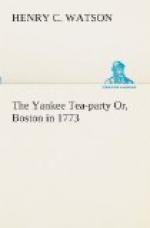manoeuvres with more zeal. At one time a rumor
reached us that the British fleet had bombarded Boston,
and, I tell you, the men did turn out. Some of
them wanted to march right down to Boston. Everywhere
the people were crying ‘to arms! to arms!’
and we thought the war had commenced, sure enough;
but it didn’t just then. However, there
was about thirty thousand men on the march to Boston,
and they wouldn’t turn back until they found
the report was a hoax. Soon after, the Provincial
Congress met, and they ordered that a large body of
minute-men should be enrolled, so as to be prepared
for any attack. The people of our province took
the matter into their own hands, and organized a body
of minute-men without orders. Our company was
included. We were all ready for fight, but were
determined that the red-coats should strike the first
blow; so we waited through the winter. In March,
Gage saw that great quantities of powder and balls
were taken out of Boston into the country, in spite
of his guard on the Neck. Every market wagon,
and every kind of baggage, was stowed with ammunition.
He then sent a party of troops to Salem to seize some
cannon and stores our men had placed there; but Colonel
Pickering, with a few men, made such a show, that the
red-coats marched back again, without accomplishing
their object. Our chief deposit of stores was
at Concord, up here about twenty miles from Boston;
and when our militia-general found that Gage was sending
out parties to sketch the roads, with the aim of getting
our stores into his hands, he sent word to our company
to be on hand, and, if we could, to come up near Concord.
John Hancock, Samuel Adams, and all of our other big
men, left Boston and went to Lexington, to keep the
people moving and ready for an attack.”
“Dr. Warren stayed in Boston,” interrupted
Pitts, “to keep the others informed of the movements
of the red-coats.”
“Yes,” continued Kinnison; “the
royals, as Deacon Slocum used to call ’em, didn’t
hate Warren as much as they did John Hancock and the
Adamses. Well, when Captain Williams heard of
what General Gage was after, he told us we had better
be prepared to march at a minute’s warning.
Gage sent eight hundred troops, under Colonel Smith
and Major Pitcorn, on his rascally errand. They
started from Boston about nine o’clock on the
night of the eighteenth of April, never thinking that
our men knew anything about it—but we were
awake.”
“Wait a bit,” said John Warner, one of
the veterans who had not yet spoken. “I’ll
tell you something. I was in Boston when the red-coats
started, and knew that the country militia were ready
to protect the stores. I was standing on the
Common, talking to a few of my friends of my own politics,
when I said rather loud, ’the British troops
will miss their aim.’ ‘What aim?’
inquired a person behind me. ’The cannon
at Concord,’ replied I as I turned to see who
asked the question. The man was dressed in British
uniform, and he walked away as I turned to look at
him. One of my friends whispered to me that it
was Lord Percy. Soon after, guards were set at
every avenue, and nobody was allowed to leave the
city.”




